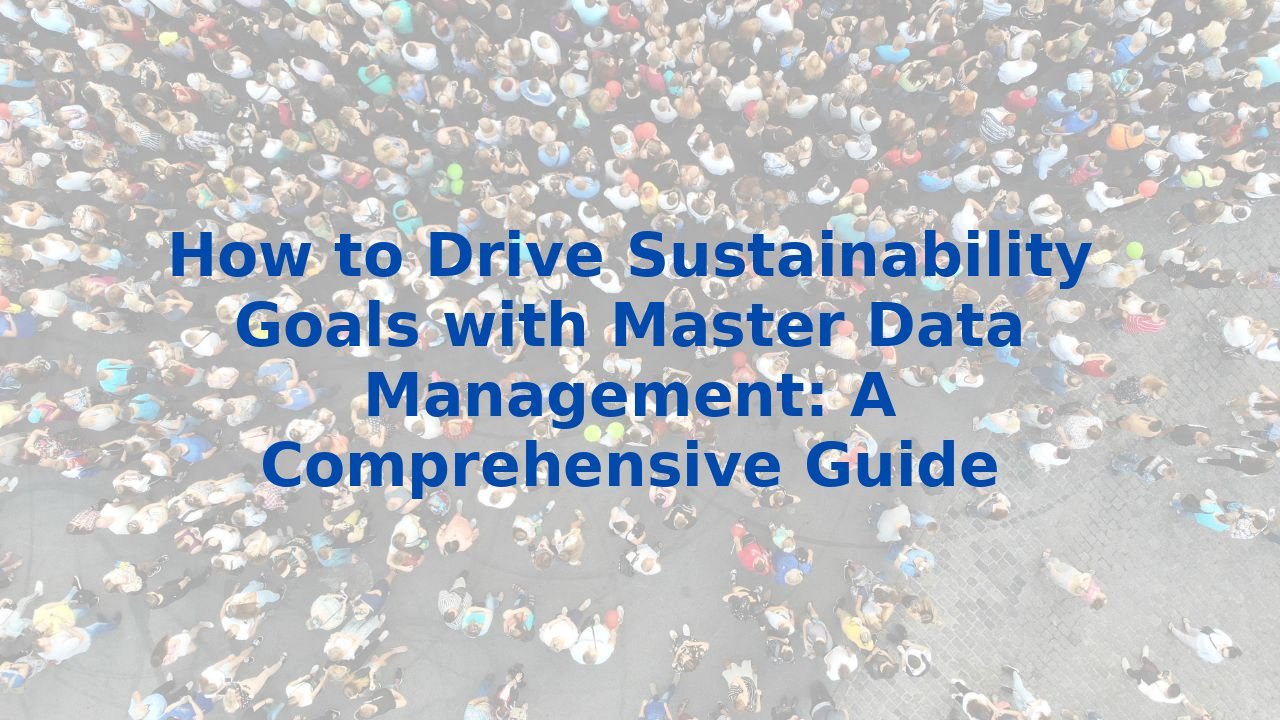How to Drive Sustainability Goals with Master Data Management: A Comprehensive Guide
How to Drive Sustainability Goals with Master Data Management: A Comprehensive Guide
In an increasingly complex world, the pursuit of sustainability is no longer just an ethical choice; it's a business imperative. Companies are recognizing that sustainable practices can lead to significant competitive advantages. One of the most powerful enablers of achieving these sustainability goals is Master Data Management (MDM), bolstered by the transformative power of Artificial Intelligence (AI). This guide will explore how businesses can leverage MDM and AI to drive their sustainability ambitions.
Understanding Master Data Management
At its core, Master Data Management is about ensuring an organization has a single, accurate view of its key business entities—customers, suppliers, products, and locations, to name a few. When data is fragmented or inconsistent, it can lead to inefficiencies, miscommunication, and ultimately, missed opportunities for sustainability.
The Role of AI in Master Data Management
Integrating AI into MDM processes enhances the organization’s ability to manage its data effectively and align it with sustainability goals:
1. Data Cleansing and Validation
AI algorithms can rapidly analyze large datasets to identify inconsistencies, inaccuracies, and outdated information. By automating these cleansing processes, organizations can ensure that they are making decisions based on reliable data, paving the way for accurate reporting on sustainability metrics.
2. Data Integration
AI-driven integrations allow disparate data sources to communicate seamlessly. With a unified data landscape, organizations can more effectively track and manage resources, ensuring efficient allocation and reducing waste.
3. Predictive Analytics
AI can help organizations forecast resource consumption trends and identify potential areas for improvement. By analyzing historical data combined with real-time inputs, businesses can implement more informed sustainability strategies that minimize environmental impact.
Enhancing Business Processes through AI
Beyond MDM, AI can revolutionize business processes across the board, driving efficiency and transparency in ways we once thought impossible.
1. Process Discovery and Mapping
Utilizing AI for process mining and pattern recognition enables organizations to uncover inefficiencies that may otherwise remain hidden. This critical analysis lays the foundation for effective sustainability measures.
2. Process Automation
Automating processes with AI bots reduces manual labor and mitigates errors, enabling employees to focus on strategic initiatives rather than mundane tasks. This shift not only enhances productivity but also drives engagement, as employees participate in more meaningful work.
3. Continuous Improvement
AI helps organizations monitor processes continuously, leveraging insights to refine operations iteratively. This adaptive approach ensures that sustainability efforts remain aligned with evolving business objectives and industry standards.
Benefits of AI in Achieving Sustainability Goals
The integration of AI in business processes yields multiple benefits that directly support sustainability initiatives:
- Operational Efficiency: By optimizing processes and reducing waste, AI delivers significant cost savings, allowing organizations to invest more in sustainable practices.
- Informed Decision-Making: AI provides timely and accurate insights, enabling companies to make strategic choices that advance their sustainability objectives.
- Enhanced Compliance: Automated compliance checks reduce the risk of non-conformance to sustainability regulations, protecting the organization from potential penalties.
- Customer Engagement: AI-driven personalization boosts customer satisfaction, fostering loyalty and encouraging more sustainable consumption patterns.
Empowering Employees Through AI Training
The true potential of AI can only be harnessed when employees are equipped to work with these transformative technologies. Training is essential and offers numerous advantages:
- Enhanced Understanding: When employees comprehend AI capabilities, they can leverage these tools creatively, driving innovation in sustainability practices.
- Data Literacy: Training ensures that employees can interpret the insights AI generates, empowering them to make informed and impactful decisions.
- Process Optimization: With knowledge of AI-assisted processes, employees can identify further optimization opportunities, enhancing overall operational efficiency.
- Innovation: Employee training on AI encourages a mindset of adaptability and innovation, crucial for driving sustainable change amidst rapid technological progress.
Conclusion
As organizations strive to achieve their sustainability goals, leveraging Master Data Management enhanced by AI presents an unparalleled opportunity. By automating processes, ensuring data integrity, and empowering employees through focused training, companies can significantly improve their operational efficiency and drive impact. The journey towards sustainability is not just about what we accomplish, but how we ensure that every step we take is informed, efficient, and purposeful.
For businesses keen on exploring how AI training can elevate their workforce and equip them with essential skills, consider comprehensive programs that provide the knowledge needed to navigate these exciting technological realms. As we take these significant strides forward, let us remember that the most sustainable businesses are those that harness not just technology, but also the human element behind it.



